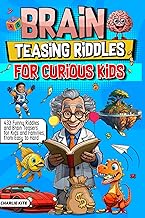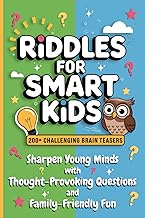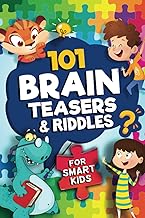Unlock Learning & Laughter: Word Brain Teasers for Kids to Boost Vocabulary!
Every parent wants their child to excel, and a strong vocabulary is a cornerstone of academic success and effective communication. But how do you make vocabulary building exciting instead of a chore? The answer lies in the power of play!
Word brain teasers for kids are a fantastic, fun, and often overlooked tool for strengthening vocabulary. They transform learning into an engaging game, encouraging children to think critically, solve problems, and naturally absorb new words. This article will dive into why these puzzles are so beneficial, explore various types, and provide practical tips to incorporate them into your child’s routine.
Why Word Brain Teasers Are Gold for Kids’ Vocabulary
Beyond just memorizing definitions, word puzzles offer a holistic approach to language development. Here’s how:
Makes Learning Fun & Engaging
- Reduces Learning Resistance: Kids are naturally drawn to games and challenges. Brain teasers frame vocabulary as an exciting quest, not a dry lesson.
- Increases Retention: When children enjoy an activity, they’re more likely to remember what they’ve learned. The ‘aha!’ moment of solving a puzzle cements new words in their memory.
Boosts Cognitive Skills
- Problem-Solving: Children must analyze clues, make connections, and strategize to find answers, sharpening their logical thinking.
- Critical Thinking: Puzzles often require understanding nuances of language, context, and implied meanings, fostering deeper cognitive processing.
- Memory & Recall: Actively searching for words or remembering definitions strengthens memory pathways.
Expands Word Knowledge Naturally
- Contextual Learning: Many teasers present words within a riddle or a clue, helping kids understand their usage in different situations.
- Encourages Exploration: When stumped, children are motivated to look up words, ask questions, or discuss meanings, leading to organic vocabulary expansion.
- Improves Word Relationships: Understanding synonyms, antonyms, homophones, and other word relationships is key to a rich vocabulary, and many puzzles focus on these.
Enhances Communication Skills
- Better Word Choice: A wider vocabulary allows children to express themselves more precisely and vividly, both in speaking and writing.
- Improved Comprehension: Understanding more words means better reading comprehension and the ability to grasp complex ideas.
Popular Types of Word Brain Teasers for Kids
There’s a wide world of word puzzles to explore, catering to different ages and learning styles:
Riddles
These classic word puzzles describe something without naming it, requiring clever thinking and an understanding of descriptive language.
Anagrams
Anagrams involve rearranging the letters of one word or phrase to form another. They’re excellent for spelling and recognizing letter patterns.
Word Searches
A grid of letters containing hidden words, typically related to a theme. Great for word recognition, scanning skills, and reinforcing spelling.
Crossword Puzzles
Clues lead to words that are filled into a grid, intersecting with other words. These are fantastic for definitions, synonyms, and contextual understanding.
Rebus Puzzles (Picture Word Puzzles)
These use pictures, letters, and symbols to represent a word or phrase, challenging kids to think outside the box.
Homophone/Homograph Challenges
Focuses on words that sound alike but have different meanings/spellings (homophones) or words spelled alike but have different meanings/pronunciations (homographs).
Word Ladders
Start with one word and change one letter at a time to reach a target word, with each step forming a valid word.
Practical Tips for Incorporating Word Brain Teasers
Making these puzzles a regular part of your child’s routine is easy with a few simple strategies:
Start Simple & Gradually Increase Difficulty
Begin with puzzles that are easy enough to build confidence and prevent frustration. As their vocabulary and problem-solving skills grow, introduce more challenging teasers.
Make It a Family Affair
Solve puzzles together! This models enthusiasm for learning, allows for collaborative problem-solving, and turns it into quality family time. You can even have friendly competitions.
Use Them as Icebreakers or Transition Activities
A quick riddle during breakfast, an anagram while waiting for dinner, or a word search as a calming activity before bed can integrate learning seamlessly into the day.
Encourage Discussion & Explanation
Don’t just give the answer. Ask, “How did you figure that out?” or “What made you think of that word?” This helps solidify their understanding and articulate their thought process.
Leverage Online Resources & Books
There are countless apps, websites, and puzzle books dedicated to word brain teasers for kids of all ages. Explore different formats to keep things fresh and engaging.
Create Your Own Puzzles
Once your child understands the mechanics, encourage them to create their own riddles or word searches. This deepens their engagement with words and fosters creativity.
Reward Effort, Not Just Correctness
Emphasize the fun of the challenge and the effort put in, rather than solely focusing on getting the right answer. This builds resilience and a love for learning.
Age-Appropriate Word Teaser Ideas
Tailoring puzzles to your child’s developmental stage is crucial for engagement:
Preschool/Early Elementary (Ages 3-6)
- Simple Rhyming Riddles: “I rhyme with ‘cat’ and I wear a hat. What am I?” (Bat)
- Picture-Based Word Matching: Match a picture of an animal to its name.
- “I Spy” with Descriptive Words: “I spy with my little eye something that is shiny and red.”
Elementary School (Ages 7-10)
- Classic Riddles: More complex descriptions requiring basic inference.
- Simple Word Searches & Crosswords: Themed puzzles (e.g., animals, school supplies).
- Basic Anagrams: Rearranging short, common words (e.g., “STOP” to “POTS”).
- Homophone Matching: Provide sentences where children choose the correct “to, too, two.”
Upper Elementary/Middle School (Ages 11-14)
- Complex Riddles: Requiring abstract thinking and multi-step logic.
- Challenging Crosswords & Anagrams: Longer words, more obscure clues, and phrases.
- Rebus Puzzles: More intricate visual word puzzles.
- Word Ladders: Longer chains of words, perhaps with a theme.
- Vocabulary Building with Synonyms/Antonyms: Puzzles focused on finding words with similar or opposite meanings.
Conclusion
Word brain teasers are more than just games; they are powerful educational tools that seamlessly blend fun with fundamental learning. By introducing your child to the exciting world of riddles, anagrams, crosswords, and more, you’re not just expanding their vocabulary – you’re nurturing their critical thinking, problem-solving abilities, and a lifelong love for language.
So, go ahead! Challenge their minds, spark their curiosity, and watch their vocabulary flourish, one delightful puzzle at a time. Learning has never been so entertaining!
Related Amazon Products

Ultimate Puzzle Challenge!: 125+ Brain Games for Kids, Mazes, Brain Teasers, Word Searches, Crossword Puzzles, Sudoku, Logic Puzzles and More, Kids Activity Book (Highlights Jumbo Books & Pads)

Brain Teasing Riddles For Curious Kids: 433 Funny Riddles And Brain Teasers For Kids And Families, From Easy To Hard

Riddles for Smart Kids: 200+ Challenging Brain Teasers and Fun Logic Puzzles for Ages 9-12
As an Amazon Associate I earn from qualifying purchases.







